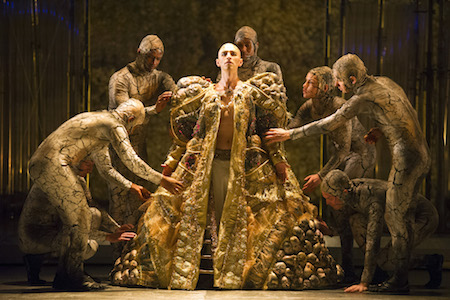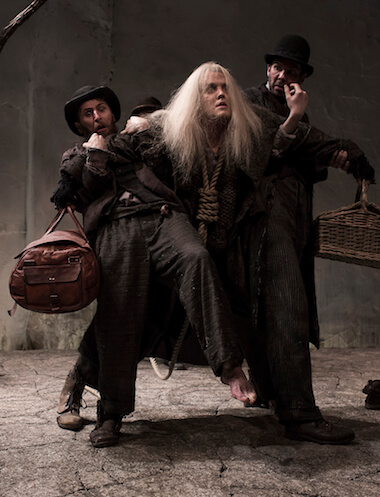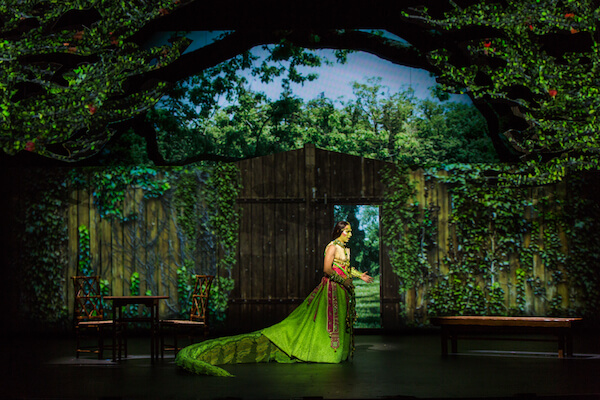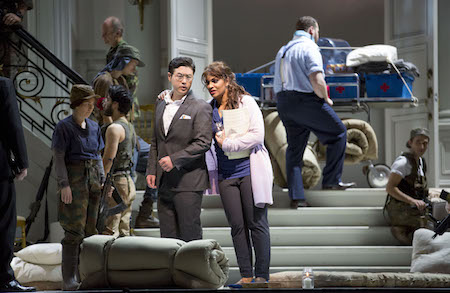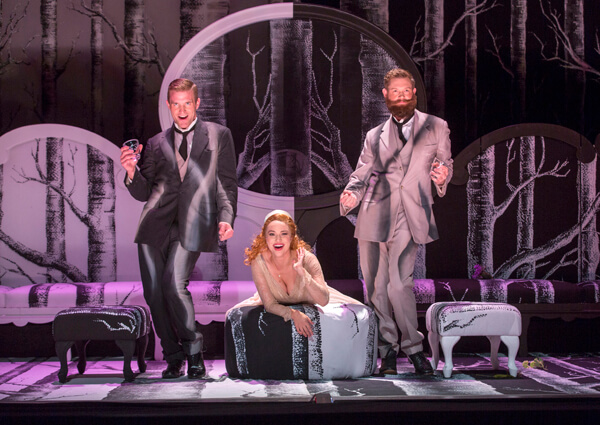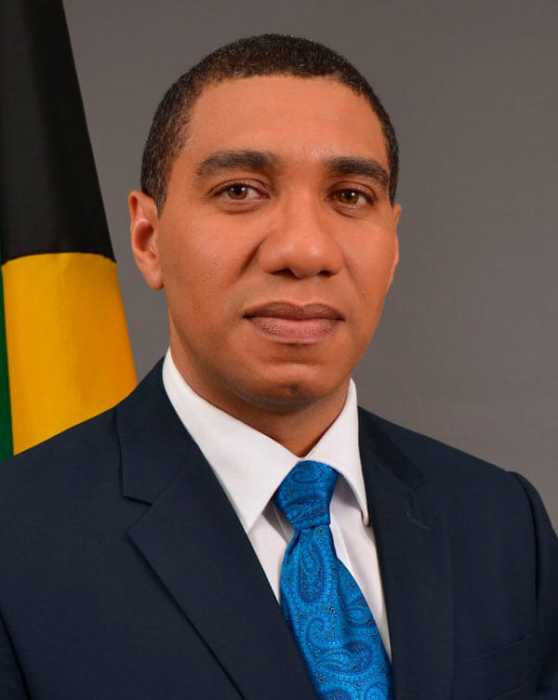BY DAVID SHENGOLD | Victor DeRenzi has put Sarasota Opera on the map through an ultra-complete Verdi cycle that “Aida” and the rare “La battaglia di Legnano” completed this year in the company’s wonderfully intimate and refurbished 1920s theater. For better and worse, Sarasota is also probably North America’s Ground Zero for traditional productions: most everything “come scritto,” with visuals out of — no pun intended — “The Victor Book of the Opera.” Regie well done is most welcomely practiced on over-familiar repertory; the current tendency of handing newly revived rarities to theatrical directors intent on personalizing their content makes little sense. How can one meaningfully riff on “Vasco da Gama” or “Aroldo” to audiences not knowing it? So Sarasota’s generally high-quality festival offers limits but also rewards. A visit is recommended, but know what awaits you.
“Fidelio”, with its ameliorist, one-person-can-beat-oppression message, is probably the work most subject to ironic, critical Regie repackaging. In Germany, the dialogue is often jettisoned in favor of actors declaiming Adorno or political slogans. Tom Diamond managed to make this staging — visually so traditional it evoked the famous photos of Margarete Matzenauer and Elisabeth Schumann in the Met’s 1915 revival — quite moving. I’m not sure I’d ever seen a would-be “realistic” Fidelio” before, but it was instructive to see that it works when presented sincerely. That said, I hope I wasn’t the only audience member who contemplated Florida’s avidly pursuit of capital punishment and its huge racial disparities in incarceration rates.
On March 11, Ekhart Wycik led a good, propulsive reading, aided more by the winds than the brass, which strayed at key junctures — though Act II’s trumpets delivered strongly. An audience unused to German opera applauded every number; many merited it, but Wycik needn’t have stopped to encourage it when dramatic tension was thereby lost. Similarly, director Diamond shouldn’t have prompted or permitted Vanessa Isiguen — quite a good soubrette Marzelline once warmed up — to simper audibly over Leonore, cross-dressed as “Fidelio,” to win laughs that punctuated the wondrous Canon Quartet. Isiguen showed distinct promise, but Marzelline is not Adele in “Fledermaus.” All soubrettes should learn that less is more when courting audience affection.
Memorable evenings in Sarasota, London, Paris
Kara Shay Thomson, who started her career as a fine Musetta and Adina, proved a credible, really admirable Leonore. Her voice lacks individuality of color but she managed the difficult music’s every detail impressively, with shining spinto tone for dead-on high notes but also the requisite agility. Moreover, her commitment and deep feeling shaped the whole opera, as they must for a successful Leonore. Her German sounded nearer the mark than anyone else’s.
At best, Michael Hendrick, with a huge if sometimes wild can-opener of a tenor, sounded arresting as Florestan. Pitchwise, he fared best solo rather than in duets and ensembles, where he often sharped. Sean Anderson’s Pizarro, like his Iago in 2012, gave great villainy but pushed his middleweight baritone unmercifully, juddering at climaxes. Jeffrey Beruan captured Fernando’s nobility in sound. I was astounded to see that Sarasota’s program, like many European ones, lists characters in descending order of class, with Fernando — last heard, and the seventh lead — listed first: the King headlines “Aida!”
De Renzi is a fine Verdi conductor, and March 12’s “Battaglia” sounded excellently rehearsed, with the rather good overture sparkling with detail. The score in places adumbrates later works — “Luisa Miller” and “Traviata” for two. The central baritone/ soprano duet is the most moving, effective number. Nothing could make the patchy, melodramatic libretto convincing, but it was salutary to hear this ultra-patriotic hymn to a unified Italy onstage.
Todd Thomas — like Thomson, a practiced, capable artist deserving wider recognition — handled the grizzled baritone lead with aplomb and breadth. As his friend/rival Arrigo, Martin Nusspaumer showed a promising sound but squeezed legato technique; ill after a few vocal breaks, he yielded the part to studio artist Matthew Vickers, who was excellent, convincing, and clarion.
Jennifer Black showed mettlesome presence and a penetrating, interestingly resinous voice in its lower two octaves. She may just have had a bad afternoon, but the top was persistently messy, flat when not screamed and approximate technically. Lida — surely Verdi’s most kvetchy heroine — needs complete vocal mastery. If Black can get it together, she’d have a future in this repertory.
Bass Young Bok Kim (Barbarossa), a company fixture, showed excellent style and voice.
A brief trip to London and Paris disclosed some fine productions — two headed stateside, the English National Opera’s “Akhnaten” to Los Angeles and the Bastille’s “Meistersinger,” originated by Stefan Herheim at Salzburg in 2013, to the Met. Both should find warm welcomes.
Glass’ Egyptian opera is less involving than “Satyagraha” but worth hearing as led splendidly March 17 by Karen Kamensek. Anthony Roth Costanzo proved phenomenal in the lead, his bright, clear countertenor projecting with ease and phrased with great distinction. A remarkably agile, impassioned performer, he imbued the innovative, gender-bending pharoah monotheistic with huge emotional stakes. Emma Carrington (Nefertiti) unfurled sumptuous mezzo tone, impressively sculpted. Rebecca Bottone’s softer-grained Tye complemented her colleagues.
ENO’s chorus triumphed. Phelim McDermott filled Tom Pye’s high tech sets with spectacle and Kevin Pollard’s splendid costumes, but too busily. The ceaseless juggling was an all too mordant commentary on Glass’ repetitive tendencies. ENO drew sold out, excited crowds.
The Parisian “Meistersinger” was also a justly hot ticket. No fan of Wagner’s padded, self-congratulatory “comedy,” I found myself thinking that Herheim’s astonishingly visually inventive reading — involving, to avoid spoilers, fairy-tale changes in perspective and historically apt referents — was the only successful “Meistersinger” staging I’ve ever seen.
Cogent conductor Philippe Jordan, an out gay artist, garnered ovations. Michael Volle — Salzburg’s Sachs — jumped in at the last minute for Gerald Finley with extraordinary command and ease, a great impersonation, as was Guenther Groissboeck’s silken Pogner.
Showing endurance, vocal scope and charm, Brandon Jovanovich aced Stolzing, the trickiest role to cast; if Jonas Kaufmann bails yet again, he should bring it to the Met. Julia Kleiter’s sympathetic Mozartean Eva soared when needed. Bo Skovhus’s “divo” Beckmesser proved too finicky and attention-getting, Toby Spence’s capering, youthful-looking David dryish and patchy. But — as with the whole production — nothing was random or unintelligent.
Also in London, it was nice to return to the elegance and fine orchestra of Covent Garden even for a somewhat muted “Trittico” (March 15) in Richard Jones’ too extra-heavy update. Nicola Luisotti’s players made beautiful sounds, but he took a very episodic approach to “ Tabarro.” Out American singers Patricia Racette and Carl Tanner worked strongly as the lovers. Racette makes the absolute most of somewhat receding resources, fielding a potent high C, while Tanner dispatched Luigi’s tough music with power. Lucio Gallo proved an ineffective Michele.
Luisotti had to keep the orchestra low for lyric soprano Ermonela Jaho’s extremely touching but overparted Suor Angelica. Jaho had to scream the climaxes, and she and Anna Larsson (Principessa) resorted too often to parlando. Lauren Fagan lent Genovieffa striking, lovely timbre. Numerous extras marred Angelica’s lonely suicide. “Gianni Schicchi” worked the best as an overall musical concept, though many among the ensemble sounded worn. Gallo’s amusing, idiomatic Schicchi was still weak vocally.
Fun to see Rebecca Evans (Nella) and Marie McLaughlin (Ciesca), looking “Mamma Mia”-ready. Gwynne Howell (Simone) remains a classy bass at 77, and Elena Zilio, another veteran, made an amusing Zita. Susanna Hurrell’s Lauretta sounded completely ordinary — like a conservatory student. Easily the best sounds emerged from Paolo Fanale’s forthright Rinuccio.
David Shengold (shengold@yahoo.com) writes about opera for many venues.

